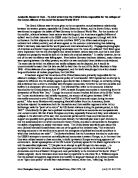What was the real meaning of destalinization, from social point of view?
What was the real meaning of destalinization, from social point of view? Historical Stalinism as definite composition of principles of business life of the country, population, administration, ideological treatment, bringing up and educating of people of the country, etc. played a great historical role. In extremely difficult circumstances of the country ruined by revolution and war, Stalinism built the bases for communistic social organization and protected them from outer attacks. But it played out and became an obstacle for normal life of the country and its further evolution. Some forces and opportunities for overcoming of this crisis appeared with the purpose of rising on a new level of communist evolution. As a result of Stalin’s Cultural Revolution a human factor of the country suffered qualitative changes. In sphere of administration and power a state apparatus of officials was formed together with over-state apparatus of Communist Party, which was more effective than Stalin’s autocracy. Level of state ideology stopped corresponding to increasing educational level of population. In other words, destalinization was carried out like natural process of maturation of Russian communism, taking of its routine form.
Stalin’s style of administration was voluntarism: the highest power forced the dependents to live and to work the way the power wanted. In fact, a real fight against Stalinism began even in Stalin’s years, long before famous speech of Khrushchev at XX Meeting of Communist Party took place. That fight was deep inside of soviet society and there are many historical facts indicating that even Stalin himself realized the necessity of changes. Khrushchev successfully used proclaimed “destalinization”, which has already begun in USSR, in personal interests and, in one hand, he welcomed the process of destalinization, in another hand, he did everything possible to control it. For 14 years he was one of Stalin’s team member and he was carrying out destalinization in Stalin’s own voluntarism way. As his predecessor, Khrushchev implemented a great amount of reforms, first of all, in education, in labor and administrative policies but the majority of them were superficial changes necessary to be undertaken after the times of Stalin’s terror and reestablishing of people trust to each other and bodies of administration. Even his famous agricultural reformations mostly failed in five-six years because the decisions were frequently made without proper planning of the results and prediction of possible consequences in long term. Symptomatic of the country's economic problems was ruining in 1963 of Khrushchev's special seven-year economic plan, two years short of its fulfillment. As a result, all the establishments of economic, social and ideological system of Soviet Union, formed and developed by Stalin, kept the country in continuing economical and success and brought USSR to outstanding achievements in global level.







